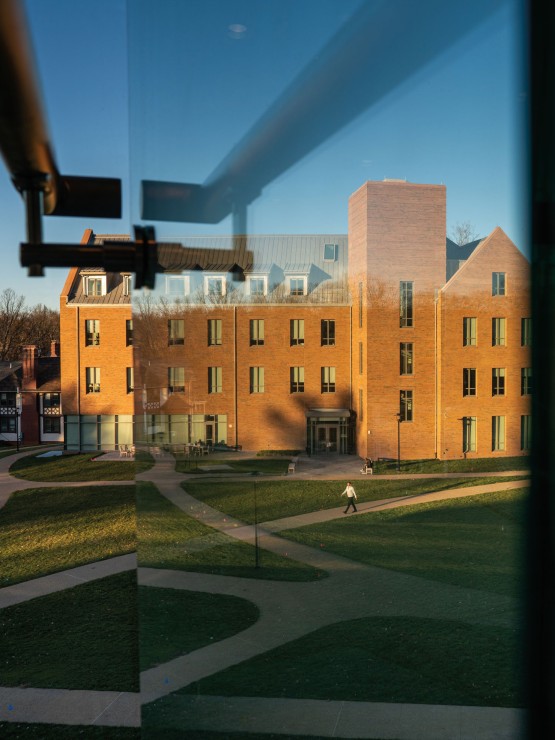We know that you and your family are heavily weighing costs when searching for colleges, and with good reason.
The sticker prices of private institutions can be startling, but the facts here at Kenyon should reassure you.
We meet 100% of demonstrated financial need for all admitted students, and we meet that need for all four years. And nearly 80% of our students receive some sort of financial aid, including need-based, merit and talent scholarships. All told, students pay an average of 47% less than the price listed on our website.
Making Kenyon accessible to students from all backgrounds is the foundation of our financial aid philosophy, and our financial aid experts are here to help you navigate this process and answer any questions you have about affording Kenyon.
At Kenyon, we make it a priority to connect you with current Kenyon students, so that you can hear directly and authentically from them about their own experiences.
Our student guides and fellows are well-trained on the important facts and figures about Kenyon, but they also care about Kenyon and about being a helpful resource for you. We encourage you to ask them questions that you can’t easily find the answers to on a website or in a brochure, and to reach out after your visit about anything else on your mind.
Some other tips to consider when planning your college tours:
Don’t overschedule: Allot ample time in between colleges and visit no more than two per day, allowing time to reflect on each visit and explore your surroundings.
Go beyond the tour: Don’t spend all of your time at the admissions office or on a tour. When school is in session, explore the library, athletic center, dining hall and coffee shop to get a sense of what life is like there.
Sit in on a class: Attending a class is not only a way to preview a major or program you’re interested in; it’s a way of getting a feel for the learning environment at the college. Pay particular attention to the interaction between professors and students.
Take time to reflect: Immediately after a visit, write down how you felt when you were on campus. Make notes about your impressions, both good and bad. After seeing several campuses, these details may begin to blur, so it is helpful to pen your reactions while they are fresh in your mind (or gut).
While we do not have a formula, the transcript is absolutely the most important part of your application, since it is a reflection of your four years in high school.
It's not just a quick scan of final GPA and class rank, but a look at your progression. What does rigor look like at your school, and how have you pursued rigor? We learn as much as we can about the schools within the territories we represent. That background informs our read of every single application. Admissions is the art of context: community, school and family.
We also aim to honor merit, in terms of academic ability, the ability to think and write well, co-curricular involvement and talent. Kenyon is a place that values academic excellence first and foremost, so that is what drives our decision-making process.
Read more about our test optional policy.
At Kenyon, we always say that you don't start the admissions process by buying the 15-pound book of 3,000 colleges in the United States.
There has to be an internal process that happens first. You need to be able to describe the environments in which you are happy and do your best work.
Do you like the idea of being the smartest student in your class or being surrounded by really smart kids? Is it important to find a specific course of study or to have a wide range of options? Do you like the idea of meeting five new people a day or finding five people who will be your friends for life? Are you drawn to familiar people and places or are you excited by a new region, meeting students from across the nation and around the world? Do you prefer to work in a highly collaborative environment or are you energized by competition? Knowing the answers to these questions provides a protective armor in the admissions process. Being able to say, “I’m the kind of person who…” is empowering.
We can't fix the overwhelming nature of the admissions process, but we can try to be a little bit of an oasis here at Kenyon.
For instance, we would never advise you to avoid writing about certain subjects in your essay. It’s important that you write about what you know. This is not a moment to pick a topic that you think will dazzle admissions committees and then be hunting and pecking for your words.
There is an unfortunate misconception that the admissions process is a game, and that it must be played by putting on a strategic suit and demonstrating interest. The truth is that we are trying to teach you how to make big life decisions, and this is a big life decision. You have to be articulate and clear about your own interests and values. You have to be able to reflect on your past so that you can think thoughtfully and well about your future.
We know that an in-person visit to campus is a critical part of your decision-making process, and that nothing can replace that experience.
We also know that you are trying to narrow down the list of schools that you’d like to visit and that resources like websites, virtual tours, virtual information sessions and Instagram accounts can help give you an idea of what a certain college is like.
While online offerings can tell us a lot about a place, they don’t tell us everything. Use websites and virtual tours as starting points to formulate your impressions, and then talk to people who know you best: your teachers, coaches, family members, friends and neighbors. They may help you consider things from a different perspective and remind you of what got you excited about a particular college in the first place. Admissions officers are also eager to connect you with current students and professors — they can answer your questions, yes, but they can also better acquaint you with the people who have chosen to study and teach at that college.
The interview is not an inquisition; it is a conversation — another chance for you to figure out whether the institution is the right match for you and for us to gain a better understanding of why you do the things you do.
Be ready to talk about your high school experience and your classes, as well as the activities and subjects that excite you. Many students are surprised by how much they enjoy the interviews: they can be opportunities to ask questions and learn about the college, and to show a side of yourself that we otherwise might not learn from reading your application.
Lowell House
104 College Drive
Kenyon College
Gambier, Ohio 43022

